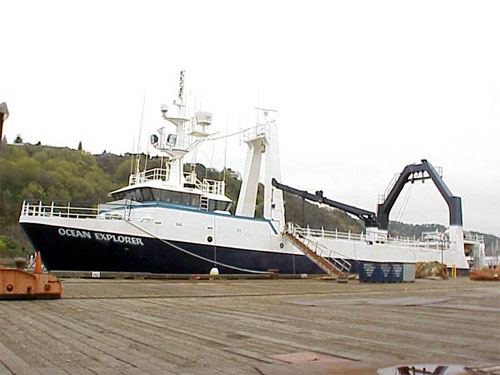 July 28, 2008
"This will be NOAA's first dedicated scientific expedition focusing on fish in the Beaufort," said Doug DeMaster, Director of NOAA's Alaska Fisheries Science Center. "It will tell us many currently unknown facts about fish and fish habitat in the Arctic, laying a baseline for further scientific expeditions to track changes in the ecosystem. It will also provide scientific data for the Arctic Fisheries Management Plan currently under development by the North Pacific Fishery Management Council."  Photo courtesy NOAA
The chartered fishing vessel Ocean Explorer will carry the expedition, leaving Dutch Harbor on July 30th and returning on August 30th. Lead scientists aboard the Ocean Explorer include Elizabeth (Libby) Logerwell, Heloise Chenelot and Sandra Parker-Stetter. They represent, respectively, the three major institutions collaborating on the study: NOAA's Alaska Fisheries Science Center, the University of Alaska's Institute of Marine Science and the University of Washington's School of Aquatic and Fishery Sciences. A total of six scientists will be working on the Ocean Explorer, which also carries a crew of six. "This is a once-in-a-lifetime research cruise. We are all thrilled to be taking part in this fascinating scientific journey to collect information in an area that has never been surveyed before," said Logerwell. The Minerals Management Service of the Department of the Interior is funding the study. Scientists expect the bottom trawl surveys to reveal facts about the distribution and abundance of adult and juvenile demersal fish and their dominant benthic invertebrate prey in offshore habitats from about 20 meters deep to the Beaufort sea shelf break. Acoustic surveys-similar to those used during other routine Alaska Fisheries Science Center surveys-will assess the distribution and abundance of pelagic (open ocean) fish. Acoustic surveys are limited to times and areas that will not conflict with subsistence whaling operations. Plankton tows will collect samples needed to quantify the species composition, abundance and biomass of the zooplankton prey available to the fish. Concurrent physical oceanographic data will be collected to assess water column properties. Scientists will also record
marine mammal observations and make formal transects for sea
birds daily as the Ocean Explorer travels from Dutch Harbor to
the Beaufort Sea and back.
On the Web:
Source of News:
Publish A Letter in SitNews Read Letters/Opinions
|